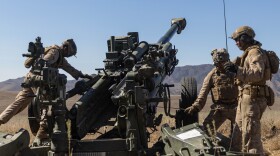RENEE MONTAGNE, host:
The Iraqi town of Haditha used to be synonymous with mistakes in Iraq. Marines killed two dozen civilians there. The incident led to the biggest criminal proceeding since the Iraq War began. In the year since the killings, the story has evolved.
Eight Marines were originally charged. Now only one faces the possibility of jail. A judge recently dismissed charges against the battalion commander in the case. NPR's John McChesney brings us up to date.
JOHN McCHESNEY: The Haditha killings first surfaced in a Time magazine article, but didn't become national headlines until Congressman John Murtha said this in a news conference…
Representative JOHN MURTHA (Democrat, Pennsylvania): It's much worse than reported in Time magazine. There was no firefight. There was no IED that killed these innocent people. Our troops overreacted because of the pressure on them, and they killed innocent civilians in cold blood.
McCHESNEY: A popular member of a Marine squad had been killed by an IED in Haditha that day, and his fellow squad members, led by Staff Sergeant Frank Wuterich, cleared houses nearby with grenades and rifle fire, killing men, women and children. A public affairs officer put out an inaccurate press release saying that the civilian deaths resulted from that roadside bomb.
That led to allegations of a cover-up, and then two major investigations led to charges that the squad had gone on a revenge rampage. But defense lawyers argue that the Marines were just doing what they were trained to do.
Neil Puckett represents Sergeant Wuterich, the last squad member facing a court martial.
Mr. NEIL PUCKETT (Attorney): The Marines followed the training that they had received to date in responding to an IED attack followed by a complex follow-on attack, including sniper fire. The fact that weapons were not found and insurgents were not positively identified does not mean that the Marines were not allowed to seek out and eliminate threats that were posed to them that day.
McCHESNEY: That's been a persuasive defense in some of the other cases. In Wuterich's defense, Puckett plans to point out that what happened in Haditha forced the Marines to dramatically change their training and rules of engagement.
Mr. PUCKETT: They only took a close, serious look at the training for rules of engagement after this happened. The training was inadequate to the circumstances of that day.
McCHESNEY: Of course, not everyone agrees with this defense. Bing West, a Marine infantry officer during the war in Vietnam and later an assistant secretary of defense, says once Wuterich saw three men, two women and a child killed in that first house, he should've changed course.
Mr. BING WEST (Former Marine Infantry Officer, Former Assistant Secretary of Defense): What you really want to do in that kind of scene if you can is to say stop. Let's get somebody in here who's experienced this before and stop and try to understand where that fire's coming from, what's going on.
McCHESNEY: It was Sergeant Wuterich's first combat experience, and they didn't stop. Someone shouted that a man had run from the first house to another, and so the squad went on to kill five women and two children while clearing that second house. At day's end, 24 civilians had been killed.
Another Marine, Colonel John Ewers was involved in the early investigation of the incident and said this to PBS's "Frontline" program.
(Soundbite of TV show, "Frontline")
Colonel JOHN EWERS (United States Marine Corps): We're the toughest guys on the block. We know how to defend ourselves. We know how to aggressively take people down. And to suggest that we can't do the shades of gray in between is a copout, and I think its sells Marines short.
McCHESNEY: Colonel Ewers has become a controversial figure in this case. He was an early investigator in the incident and a potential government witness. But he was also a legal adviser to General James Mattis, the commander who brought charges against the eight Marines. That led a Marine judge to dismiss dereliction charges against Wuterich's battalion commander, ruling that General Mattis had been improperly influenced by Ewers.
Gary Solis, who teaches law of war at Georgetown University, says the ruling was highly unusual.
Professor GARY SOLIS (Law, Georgetown University): It seems to me that if this case were followed in other instances, well, then who could a commander turn to? Should a commander now not talk to investigators to determine the facts of a case? Can a commander now not talk to his staff judge advocate, who may have unique information about a case?
McCHESNEY: Marine prosecutors are appealing that decision, but Sergeant Wuterich's lawyers say they will also use the same unlawful command influence as the defense. And Sergeant Wuterich's case is also entangled in another legal snarl. Prosecutors want the outtakes from his lengthy interview with CBS's "60 Minutes," but CBS is appealing. At this point, no one knows when the final Haditha case will go to trial.
John McChesney, NPR News. Transcript provided by NPR, Copyright NPR.






